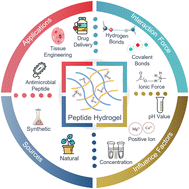Mechanisms and influencing factors of peptide hydrogel formation and biomedicine applications of hydrogels
Abstract
Self-assembled peptide-based hydrogels have shown great potential in bio-related applications due to their porous structure, strong mechanical stability, high biocompatibility, and easy functionalization. Herein, the structure and characteristics of hydrogels and the mechanism of action of several regular secondary structures during gelation are investigated. The factors influencing the formation of peptide hydrogels, especially the pH responsiveness and salt ion induction are analyzed and summarized. Finally, the biomedical applications of peptide hydrogels, such as bone tissue engineering, cell culture, antigen presentation, antibacterial materials, and drug delivery are reviewed.



 Please wait while we load your content...
Please wait while we load your content...